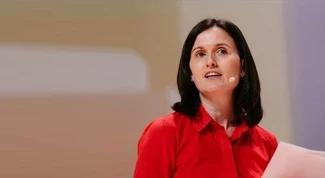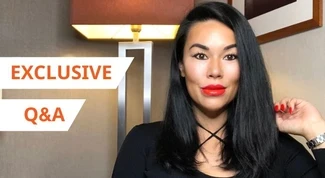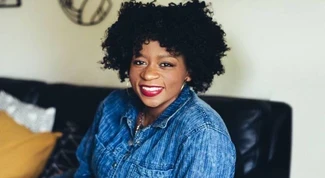Known as ‘The Inspirational Mentor’, Emma-Jane Taylor has turned her trauma into motivation, using her story of childhood abuse and abandonment to tackle taboo topics, raise awareness and educate the next generation.
In her youth she was labelled ‘the girl going nowhere’, but Emma-Jane remained driven and determined against all odds. Now a successful entrepreneur, she is the CEO and founder of numerous businesses including OceanWorks Retreats, StageWorks Performing Arts School and The Works Company.
As a successful Mentor and passionate keynote speaker, Emma-Jane is described as ‘authentic, courageous and unstoppable’, inspiring positive change in her audience. In this exclusive interview, Emma-Jane reveals what motivates her, how she stays mentally fit, and why you should always reach out if you are struggling.
Q: What advice could you give to those struggling in the current climate?
“The most important thing is to never doubt yourself. There's always another way to look at a difficult situation. When you feel as though things are going wrong, put the brakes on and look at what's going on around you. What is your end goal? Your goal might be very different now compared to what it was six months, or a year ago, but if you still want that end goal, how can you now manoeuvre yourself to get there?
“So, my advice would be, put the brakes on, take a moment to reflect, and then look at what it is you're trying to achieve. Readjust those goals and readjust your direction to get to those goals.”
Q: Considering the shocking abuse statistics that came out of the lockdown period, how important is it to keep the conversation going surrounding abuse?
“It is the most important thing! To continue the conversation, I put on my steel pants and took it to national platforms and through doing that I realised its importance, which was to remind people they are not alone. I've had hundreds of messages thanking me and saying it's really given them hope, it's given them a chance to reflect and change.
“You don't need to stand on a stage or be in a national newspaper, you could simply start by talking to your friend, a therapist or family member. So, it's important people understand that actually talking about it releases it, and that you're not alone. When I first started talking about my story to a therapist, when I was in my early 20s, I thought I was the only one in the world who was going through a difficult time, and I wasn't.
“By sharing my story, I know it's giving someone else hope. I only ever do this to give someone else an opportunity to find their success. And by success, I don't mean monetary, I mean their success from peace of mind, knowing that the journey they're on is something they don't need to do alone.”
Q: What drives you to be a voice for those that don’t have one with regards to abuse? And why is it important to address ‘taboo’ topics?
“Because if we don't address taboo topics, they stay suppressed. I was a suppressed voice for years and years, too afraid to speak out, too afraid to hurt people. And in fact, if you've been abused or you're going through difficulties, quite often, you will have an emotional attachment to your abuser, not because you necessarily like them, just because you feel you've been groomed enough to have formed a bond with them - a trauma bond.
“So, when you take that away, you still have this fear of upsetting the apple cart. Obviously, I had to take into consideration my family, especially my parents. Talking from my own experience, the difficulties I went through from being abused and then what followed - PTSD, OCD, bulimia and depression, addictions, feeling like I was a failure. Feeling paranoid, feeling like I wasn’t a good person, meant that I suffered a lot for years and years from the fallout.
“So, by not saying anything, I was just suppressing that and containing it. Once you decide to talk about it a little bit, those feelings come out and then you start finding this new strength, this new power and new success because you're releasing it.
“Once you start releasing it, people start saying, ‘wow, thank you, that's really helped me’, and you realise the greater good it's doing for other people. That greater good became the role for me and allowed me to go, ‘OK, if I can be a voice, one voice of I'm sure many people who are starting to speak up about it, then we are helping that next generation’.
“In fact, women in their 70s and 80s have been contacting me saying, ‘thank you, it's allowed me to talk to my husband or my family or a therapist’, and they’re in the later years of their life! Now they've got this freedom that allows them to let go. Once you can start letting go, you start seeing things differently.
“I want to educate, not just my generation, but my daughter's generation and her generation to follow. Communication is really important. Sharing, listening, absorbing. You don't have to give; you can just receive, and while you're receiving, you can grow as a person.
“Through my journey, I have certainly understood it wasn't that I didn’t have a good family around me, it was that they just didn't see what I would see now as a parent – so education crucial!”
Q: What do others gain from hearing your personal story?
“Knowing you're not alone, that someone else has gone through it and has stood up and shared their story on a national scale, gives people confidence.
“When I first started speaking out, I thought, ‘this might car crash my career’. And in the end, I decided, ‘you know what, I don't care if it does, I just need to be authentic and I can't be authentic living with all these lies inside of me’.”
Q: Why did you recently decide to reveal all in a ‘Sun Exclusive’?
"So, I got this opportunity to share my story in the sun and I thought it through very carefully, because this is now 30 million online readers, potentially. Regardless of the good, the bad and indifferent, I knew if I didn't raise my game, then I wouldn't be doing what I’d always set out to do, which is to give back my voice to help others find theirs.
“So that's why I did it and I’m very proud of myself. I took 24 hours just to soak up the actual enormity of what I just achieved! And through doing so, I've had tons of messages, tons of support. Like I said earlier on, people just thanking me because it's helped them now find their voice. It was a really proud moment and regardless of what happens next, it has opened the eyes of lots of men and women.
“I wouldn't wish my journey on other people and I would be more than happy not to live it again, but actually, I wouldn't change it because it's the only life I know, and it's got me where I am today - it's been positive in that respect.”
Q: You’re a huge advocate for therapy and it played a big part in your recovery - How important is it to seek help and talk to others when suffering?
“Really important. When I first stepped out, I was terrified. I rang up a therapist that was living around 40 miles away from my hometown so I wouldn’t bump into her again until the next time. That first time I thought, ‘oh, I’ll just have four or five sessions’. Well, that was 20 years ago, and what I've learned is never say never.
“First, I did talking therapy, I then moved into holistic therapy, acupuncture, reiki, hypnotherapy, psychotherapy, EFT, picture tapping, sound therapy and meditation - all of it has been part of my journey.
“Using my experience, I advise people to start as soon as. It might take you 20 years, it might only take you one year, but start. Because once you start a journey, it doesn't just help your recovery, it helps increase the possibilities and opportunities in your life, whether that be professionally or personally, because you find new confidence. Once you've got that new confidence, you'll find strength, and ultimately, success.”
Q: How do you manage stress and anxiety, and maintain a healthy mindset?
“Talking and communicating with my close family, friends and loved ones, and also understanding boundaries.
“Boundaries have been a very important part of my life and something that I speak about regularly. Just because you've got loved ones in your family or your friends’ circle doesn't mean you need to have them in your life 24/7 - you can love at a distance.
“If you feel there are times you need to distance yourself from someone, this could be for any reason. It might be that person is just not making you feel good at that point in your life, but at the same time, you still love them and want them in your life. It’s important to recognise and honour that, so talking boundaries is really important.
“Listening, learning, and passion were all key parts of my recovery. As I've grown and learned, I've listened, protected myself, and I've used authenticity to survive and succeed.”
Q: How do you maintain motivation and how can businesses motivate their employees in 2021?
“This is a really important question right now, especially with current events. Behavioural change at work is a real key part of an individual's development and growth.
“In professional environments especially, many employees cover up their true emotions for fear of being exposed and for fear of others questioning their ability as an employee, or employer, believing it might jeopardise their job if they show their vulnerability. This is something that really needs to be addressed.
“So, from a corporate point of view, this means investing time in your employees to allow them to empower themselves, ultimately supporting the growth of your workplace. It’s important to communicate, develop resilience, balance emotional, mental and physical wellbeing, and understand that not everything is always as it seems.
“If management can get behind understanding the importance of talking, doing workshops, putting programs together to balance, refocus, educate, and challenge their employees, it will help to reduce that noise, which will, in turn, support the mental health of their employees.”
Q: What can people do to build confidence and mental resilience?
“If I was working with a client on confidence, I would ask: Who are you? What do you want in your life? How are you going to get there? What do we need to do to get there? And I would look at putting boundaries in place.
“If you are not feeling confident, I would say, 'look at your boundaries', and if your boundaries are wide open and making you feel vulnerable because you are letting the wrong people into your life, then you need to put those boundaries in place.
“It's not about saying, ‘I don't want to see you again’, it's about understanding how to put this person into a box, so you don’t allow them to come too close. Then through communication, whether it be with a friend, a therapist, a family member, or even with that person, it will allow you to grow and you will feel stronger about yourself.
“Without those emotional boundaries, we are wide open and vulnerable.”
Q: What has been the highlight of your career?
“I think opening my performing arts school 20 years ago because when I left school, I was told I was a failure, I was told I was the ‘girl going nowhere’.
“For years and years, I just believed that to be true, so I was really flaky, going through my own difficulties, floating around, trying to enjoy life, but not really enjoying it. Then I got this opportunity.
“I only opened with 20/25 kids and now we've got hundreds of kids, but when I first opened it, it was that sheer euphoric feeling that I've achieved something that no one thought I was capable of.
“Fast forward 20 years and now I'm sitting at the top of a very talented team running various businesses and activities around lifestyle. So that was a big turning point for me when I realised I could do this, and that if we put our minds to something, we can do it.”
Q: If you could give yourself one piece of advice to start your career, what would it be?
“My dad always said, ‘if something goes wrong in life, don't think you are a failure, just look at doing it again another way’. Knowing what I know now, I wish I took more risks. So, I take that with me. Whatever I do, I take another risk because I can never fail, I can only learn.”
Hire Emma-Jane Taylor
To book Emma-Jane Taylor for your next event, webinar or for future bookings, simply get in touch by filling in our online contact form. Alternatively, call one of our booking agents directly on 0207 1010 553 to learn more about our booking services.









